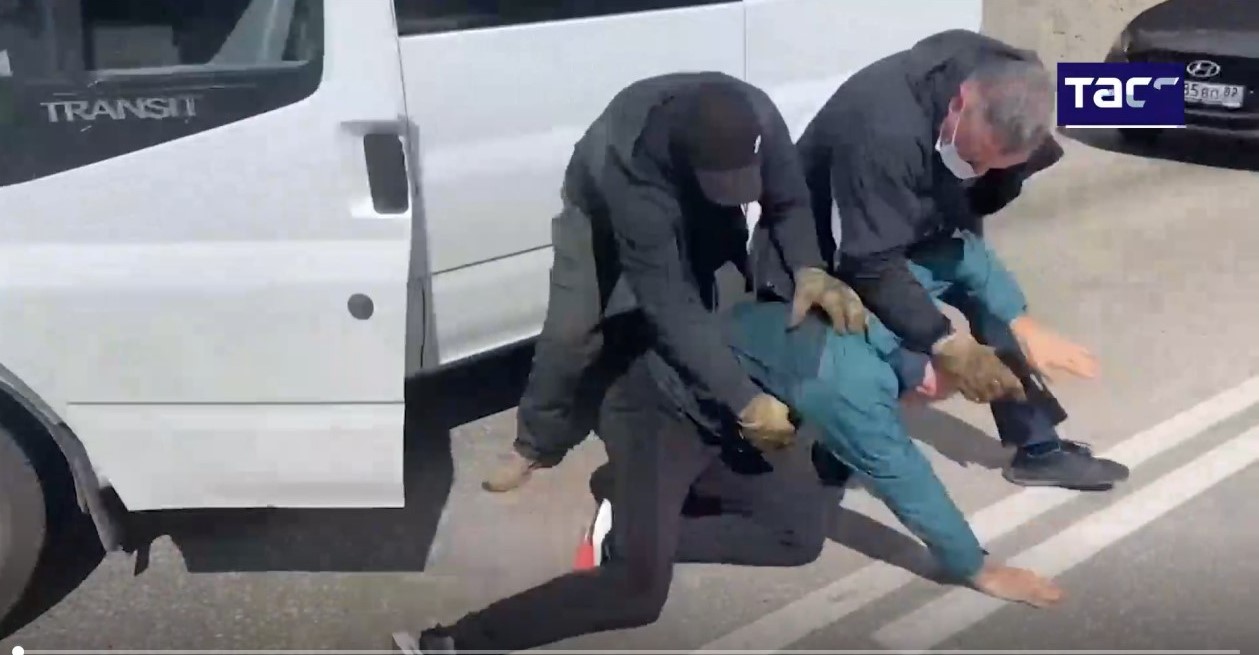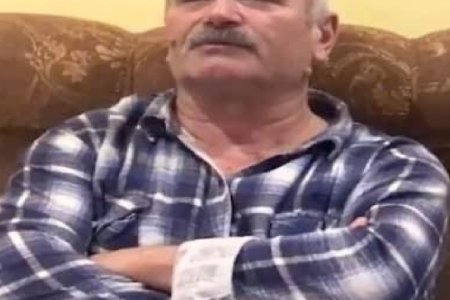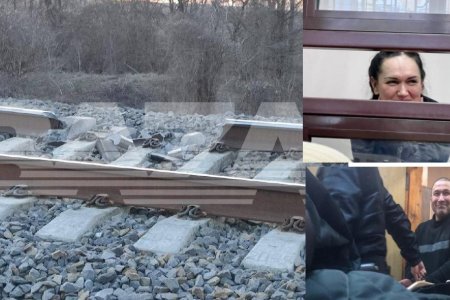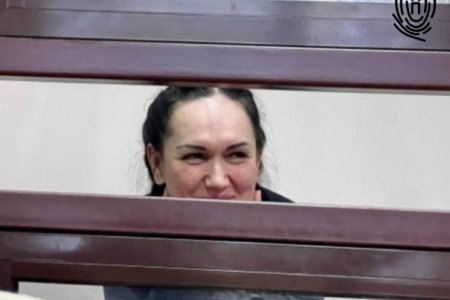
On 3 May, as the Kremlin loudly trumpeted claims about an alleged attempt to kill Russian president Vladimir Putin, the FSB in occupied Crimea were just as vocally boasting of having ‘thwarted attempts on the lives of Sergei Aksyonov and two other Russian-installed ‘leaders’ in occupied Crimea. In neither case was any real evidence provided, but the Crimean FSB reports announced the arrests of seven supposed suspects. This was the largest number of arrests at one time under Russian occupation, but in all other ways, the FSB story was drearily familiar, with the allegations against the seven men based solely on videoed ‘confessions’ and almost certainly staged ‘discoveries’ of explosives.
While the FSB are mainly charging the men with alleged ‘plans to commit terrorist acts’ which they claim to have thwarted, they have thrown in one episode which probably did happen. This was an explosion on 23 February 2023 that damaged a part of the railway track in the Bakhchysarai raion, leading to the cancellation of three trains, one from Sevastopol to St. Petersburg. Inclusion of this, however, only heightens scepticism, given that the FSB have spent the last three months carrying out a huge number of armed searches and effective abductions of Crimean Tatars, including several renowned Crimean Tatar leaders, purportedly as part of their ‘investigation’ into that episode.
In the information circulated to the media on 3 May, the FSB named six men who had just been remained in custody: Serhiy Kryvosheiin; Oleksandr Lytvynenko; Viktor Pidvalny; Serhiy Voinarovsky; Kostiantyn Yevmenenko and Ihor Zorin. All are said to have both Ukrainian and Russian citizenship. The latter, however, means little as Russia has made it virtually impossible to live in occupied Crimea without accepting a Russian passport. A seventh man, identified only by his last name Petranov, is described as a citizen of both Ukraine and Bulgaria. He is accused of involvement in getting the alleged explosive devices, concealed in hotplates to occupied Crimea. The FSB claim to have discovered five bombs, ready for use; electric detonators; radio-controlled mechanisms and trackers. According to their version, they uncovered a channel, “organized by the Ukrainian Security Service”, or SBU, by which the explosive devices were smuggled in from Bulgaria, via Turkey and Georgia. A Ukrainian national Marina Matushchak is also accused of having organized the smuggling of these hotplates. This is presumably the woman shown on the FSB videos circulated, however her status is unclear.
The FSB assert that the men were planning “a series of high-profile acts of sabotage – terrorism”, including by blowing up parts of transport infrastructure. It is, however, also claimed that they were plotting assassination attempts against Sergei Aksyonov, Russian-installed Crimean ‘leader’ - Vladimir Konstantinov (occupation ‘parliamentary speaker’) and Yanina Pavlenko, head of the occupation administration in Yalta
Their group was, purportedly, created by Ukraine’s Military Intelligence [HUR] under the leadership of Roman Mashovets, deputy head of the Office of Ukraine’s President and “a close friend of Kyrylo Budanov”, the Head of HUR.
One of the purposes of these FSB announcements is propaganda, with Aksyonov and Konstantinov carrying out their role in this. Aksyonov invariably repeats whatever claims are made by the FSB, without any consideration of the presumption of innocence. He “thanked the FSB for averting a series of terrorist acts in Crimea” and asserted that “there is no doubt” that the commissioners of these acts were in Kyiv. Askyonov, a man with a highly chequered past who is now representing an aggressor state systematically bombing Ukrainian hospitals, residential buildings and critical infrastructure, called Ukraine “a terrorist state”. He claimed that the FSB “work exactly, professionally and effectively”.
The latter have, in fact, gained notoriety for a level of sloppiness in the fabrication of politically motivated prosecutions that, according to Russian lawyer Dmitry Dinze, is far worse than anything seen in Russia. Torture is standardly used to extract the videoed ‘confessions’ used as the main ‘evidence’ in such cases, with these ‘backed’ by evidently falsified DNA samples and by ‘secret witnesses’ whose testimony cannot be verified and who normally repeat the indictment virtually verbatim.
Russian state media showed excepts of what they claimed were ‘interrogations’ of Viktor Podvalny; Oleksandr Lytvynenko and Marina Matushchak. There is nothing to suggest that any of the Ukrainians had access to independent lawyers. In virtually all such cases where those detained have ‘confessed on video’, they have later, when formally charged and able to speak with a proper lawyer, have given details of the torture used to obtain the supposed ‘confessions’.
Here Viktor Podvalny, a man seemingly in his 60s, claims to have been recruited by Roman Mashovets, whom he calls a close friend of Budanov, the Head of HUR. According to TASS, he agreed to work for Ukraine’s Military Intelligence, with the code name ‘Socrates’, because his two sons (born in 1985 and 1987) had sought to evade mobilization. Podvalny reels off ‘confessions to creating an agent network, with his duties supposedly recruiting those willing to work with HUR or the SBU. He purportedly recruited Oleksandr Lytvynenko; Serhiy Voironovsky; Kostiantyn Yevmenenko and Ihor Zorin, and also speaks of sending explosives concealed in hotplates. He further ‘confesses’ to surveillance over Aksyonov; Konstantinov and Pavlenko, with no information provided as to how he could possibly do this, except by following open sources.
A woman, presumable Matushchak, is supposed to have received one of the parcels, and is heard explaining how this happened. It remains unclear, however, why she would be speaking on video or, in fact, who she is.
Crimean Realities has tried to find information about Matushchak and all the men detained, with very limited success. Ihor Zorin is a businessman and, until Russia’s invasion, a deputy of the Yalta City Council. He left any political activities after the invasion, but remained in occupied Crimea. He was apparently subjected to an FSB search in 2022, although on that occasion the FSB did not publicly report this.
Oleksandr Lytvyenko also appears to be from Yalta, and is probably married with two children. On the FSB video, he says that he became acquainted with Podvalny when he did repairs in the latter’s home. Aside from some inconclusive information about somebody who may, or may not, be the same Marina Matushchak, Crimean Realities was unable to find out any information about the others.
Most ominously, we have no reliable information as to when those men now in custody were arrested, and how long it was before they were brought before an occupation ‘court’. That time, in the absence of independent lawyers. was almost certainly used for methods of duress that have nothing in common with rule of law.



